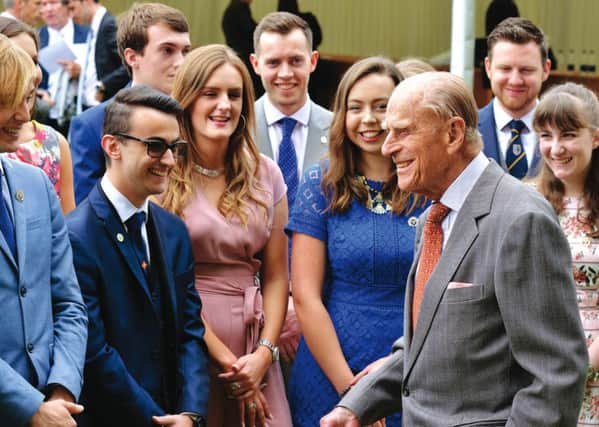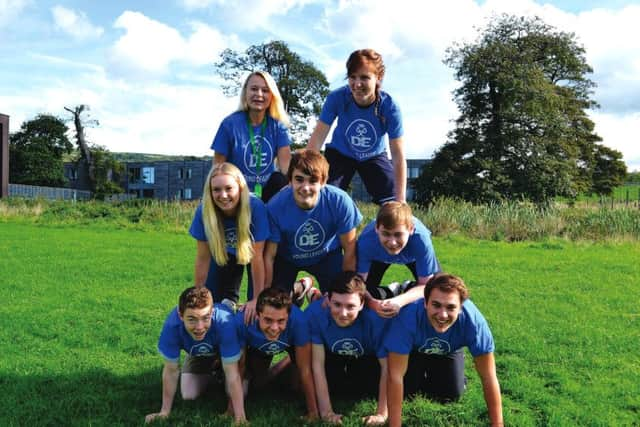The Duke of Edinburgh Awards equip young people for life


Founded by Prince Philip in 1956, it aims to inspire, guide and support young people in their self-development, recognising their achievements with Bronze, Silver and Gold awards.
So far, more than 2.7 million young people have received Duke of Edinburgh awards – 276,868 of them Gold.
Advertisement
Hide AdAdvertisement
Hide AdIn Scotland, one in six people aged 16 is participating in Duke of Edinburgh (DofE). “Up to the end of last year we had 20,300 young people start Bronze, Silver and Gold awards,” says Barry Fisher, director of DofE in Scotland.


It is so popular that it has waiting lists. But what is the attraction?
“It appeals for a whole variety of different reasons. We know that young people get a huge amount out of it by socialising, by engaging and by setting challenges and that this contributes enormously to health and wellbeing,” says Fisher. There are four sections to the programme – volunteering, physical activity, life skills and expeditions – with a fifth – residential – at the Gold level.
“Each individual’s programme is different,” says Fisher.
“Some might find expeditions pretty straightforward and volunteering could be the real challenge for them.


“You can’t do DofE over four weekends; Bronze takes six months and Gold is 18 months as an absolute minimum.
“So within all of that there is that sense of commitment.
“Ultimately it is about the ability to work together.
“That is what the expedition is really about: it is a really effective way of helping young people to come together and plan and carry out.”
The participants may not realise it at the time but the scheme gives them invaluable experience to take into the workplace.
Fisher points to the attributes that businesses are looking for in their employees. “The CBI report [Delivering excellence: a new approach for schools in Scotland, 2015] has really clear statements about wanting people to be creative thinkers, enthusiastic and team players.
Advertisement
Hide AdAdvertisement
Hide Ad“So you get a very clear articulation of why a programme like the DofE awards is guiding young people towards those attributes that can make a massive difference for their employment prospects.”
Alongside the traditional award routes, DofE Business was developed in 2007 to take the scheme’s benefits into the workplace.
DofE works closely to integrate the awards scheme into early careers training programmes, developing the soft skills alongside what is often technical training. Companies involved include ScotRail, British Gas and Amey.
When Toni Blackhurst, head of marketing and sponsorship at Scottish Rugby, sees DofE awards on a CV it makes a positive impression. “It is definitely something that stands out,” she says.
“I think it is a very positive influence in a young person’s life.”
It is the Gold expedition that most people associate with DofE. And for many participants it is a defining point of their youth.
Blackhurst’s own Gold expedition was on the North Yorkshire Moors in the middle of a heatwave.
“I could have quit after day two, it was brutal. It would have been so easy to put the call in and quit.
Advertisement
Hide AdAdvertisement
Hide Ad“I still remember the feeling of finishing and walking up the drive to my mum and dad saying I had done it. I was so proud of that kind of resilience and commitment: it was a big deal.”
From her desk at BT Murrayfield, with experience at RBS, Blackhurst reflects on what she has used from DofE in her professional career. “Definitely teamwork is pivotal,” she says.
“You are working with a group of people who may not necessarily be your friends. It helps you to understand that everybody has different skills to bring. It is not just about the quickest, or the fastest, or the strongest.
“Actually the most pivotal person in our group was the one at the back who was map reading and taking time to make sure that we were on the right path.”
It was a valuable lesson for Blackhurst. “It is very much about understanding that you will work with different people in teams that you may not necessarily get on with or you may not necessarily agree with.
“Actually understanding how you make sure that you get the best from that team and bring out the best of everybody’s skills and abilities and make sure that team is stronger because of all the parts, rather than because of one person.”
She also points to communication skills learned from her DofE experiences. “It is not only communicating with the team and under pressure when you are in the expedition landscape.”
Blackhurst explains: “Part of my service for Gold was at Barnardo’s, so I spent a lot of time working with children who had physical and mental disabilities.
Advertisement
Hide AdAdvertisement
Hide Ad“Being able to communicate in different ways; being able to articulate yourself to those children, work with those children was important.
“It also gave you an appreciation, at that age, that there are other people in a lot of other situations who are a lot worse off than yourself.”
She adds: “One of the other things I think you build through Duke of Edinburgh is confidence – confidence to step outwith your comfort zone and confidence to try new things; confidence to do new things and put yourself in different situations you wouldn’t necessarily have experienced.”
She concludes: “I think the final thing I have taken into the world of work is that ultimately you won’t get anywhere if you don’t work hard.”
Even when Blackhurst talks about her gruelling expedition, it is obvious that she also had fun. “It lets you try a whole load of experiences that ultimately, without doubt, do set you up for life.”
Collecting her Gold award at Buckingham Palace was also a happy experience.
“It was a time for me to be able to say thanks to my mum and dad for all the time, money, love and everything that they invested to make sure that I achieved the Gold award.
“To be able to go to the palace with them was something very special and something that will stay with me forever.”
This article appears in the Spring 2018 edition of Vision Scotland. Further information about Vision Scotland here.